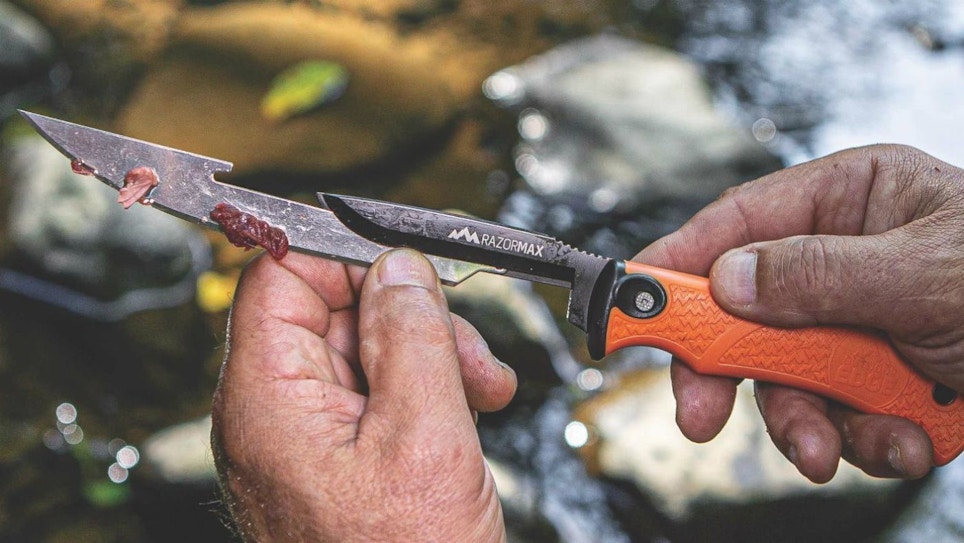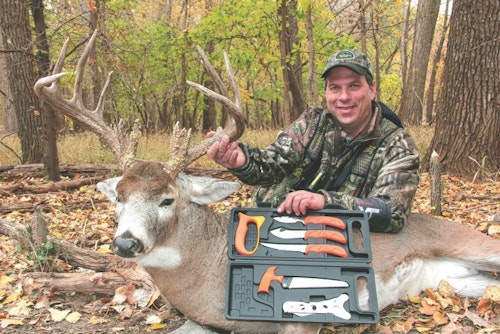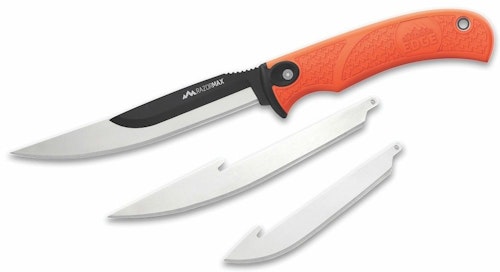Early in 1988, two years after graduating from college, David Bloch attended the SHOT Show in Las Vegas. To that trade show he lugged prototypes of a new skinning knife he’d designed for hunters while he was still a student at the Colorado School of Mines. His design was solid, his prototypes good, and that SHOT Show served as the birth of his company, Outdoor Edge.
Still based in Colorado, Outdoor Edge is now one of the leading manufacturers of hunting knives. In its 32 years of existence, Bloch’s company has added to its knife line and now offers everyday carry, tactical, camping and fillet knives as well.
Hunting Retailer caught up to Bloch late last autumn as he was driving eastward for a whitetail deer hunt. Loquacious and personable, Bloch talked about knives, the hunting industry, the changing face of retail and the importance of trade shows.
Here are some highlights from that conversation.
HR: How important do you think trade shows are for brands like yours?
DB: For us, they are extremely important. Because we don’t use a lot of independent sales reps, the trade shows offer us a really good opportunity to meet in-person with retailers and show them new products. It’s where we get lots of feedback from our dealers. For Outdoor Edge, trade shows also offer a chance to see the latest and greatest innovations in our corner of the hunting industry. The cool thing about the knife world is that while we are all competitors in some regard, we also play nicely together in the sandbox. So at trade shows, we get to look at each other’s new technologies or new steels and designs.
HR: Do you have any advice for retailers at trade shows?
DB: If you’re going to go, be prepared to take advantage of show specials that manufacturers offer. Perhaps some of the big, big brands in the hunting industry use trade shows more as a marketing platform, but smaller companies like us really use the shows to write orders.
HR: Any other advice for retailers when it comes to dealing with knife companies?
DB: Knives might be one the oldest tools in the history of humans, but knives have become so specialized in modern times that there’s no perfect knife that fits every single application. That’s why it’s important to carry several brands. If you have one or two knife brands, you’re not a knife retailer. But it’s pretty easy to become one — the key is having a selection of five or more brands. Retailers should use a distributor. My favorite is Blue Ridge Knives. They don’t require a deep investment in any one brand or model. They know what’s popular, and they can provide a retailer with a nice selection for a reasonable investment.
HR: Do most stores sell knives correctly?
DB: When I first started, every knife had to be displayed in a glass case. That’s not the way it works anymore. A lot of knives are sold in a clam shell or a box, without the customer picking them up and feeling them. The key to that is twofold. First, a lot of consumers come through the door having done their research and with decent knowledge of what they want to buy. Second, a good store will have a knowledgeable person dedicated to knife sales. If a store can commit somebody to knife sales, somebody who knows the product really well, it will pay off in increased sales.
HR: How has the consolidation of the biggest retailers and the changing landscape of specialty retail affected your business?
DB: I think we’ve done a good job of working with the biggest of the big and the smaller, specialty retailers. I don’t know how to explain the magic sauce with that. It’s all about balance. Every customer is important to me, and I think that has to come across in all interactions. Buying it right is the key for the independent retailer, and we do what we can to make it easier for them to buy right.
Like many others, we’ve seen a growth with online sales, and we realize that Amazon is the 800-pound gorilla in the room. We’ve been enforcing MAP pricing on Amazon for a number of years. I’ve been protective of our pricing for a long time now.
HR: You’ve mentioned your company has grown in each of its 32 years. That comes despite a national decline in the number of your core customers — hunters. How have you done it?
DB: Yeah, it’s a bit unsettling that the core of the industry pie just keeps getting smaller. We’ve grown by continuing to strive toward building a better hunting knife. We take market share from other brands that don’t always cater specifically to the hunter. We’ve done that by offering things like a complete game butchering kit, by making quality knives at a really affordable price point, and by adding value to what we offer the customer.
HR: What do you expect across your segment of the hunting industry in 2020?
DB: We don’t chase fads, but we keep track of them. Right now, cleavers are hot, so you’ll see a lot of companies doing cleavers. Lightweight has been a trend for a number of years — not a fad, a real trend. We’re offering knives that are lightweight and multifunctional, performance blades for high-performing hunters.
HR: Is that what’s in store from Outdoor Edge in 2020?
DB: Our most popular line is our Razor series, which is a line of lightweight knives with replacement blades. So, we’re expanding that line in 2020. We’ll have a Razor series knife that allows for easy, replaceable, interchangeable boning and skinning blades.
As part of this move toward replacement blades, we’ve also opened up some opportunities for retailers. These days, in general, for every three knives we sell, we’re also selling a pack of replacement blades. There’s certainly an opportunity for extra revenue for stores that carry and sell replacement blades.








